|
Limitar tu búsqueda
[+–] Compilador o editor
[+–] Editorial
[+–] Fecha
[+–] Formato
[+–] Idioma
[+–] Tipo de documento
[+–] Tipo de recurso
|

|
|
Social capital in labor market access and poverty in Mexico
Social capital, defined as the set of social networks that a person has in order to obtain benefits, is used by the population as a mechanism for providing resources, to cushion shocks in consumption and to obtain information on available employment opportunities. This study employs a logistic model to characterize the manner in which people access the labor market in Mexico through the use of...
|
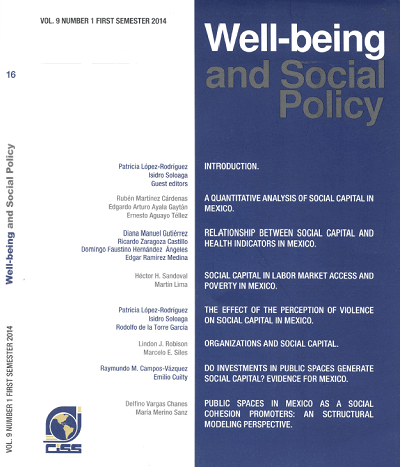
|
|
|
|

|
|
Informe de seguridad social y bienestar en las Américas 2020. Versión abreviada
Esta información permitirá formular recomendaciones de política pública que promuevan una seguridad social universal, de calidad y orientada al bienestar en las Américas, como parte de los esfuerzos basados en la cooperación internacional para garantizar el acceso a este derecho humano. Antes de comenzar, debe decirse que el ISSBA no se publica en un momento cualquiera, sino en medio de una de...
|
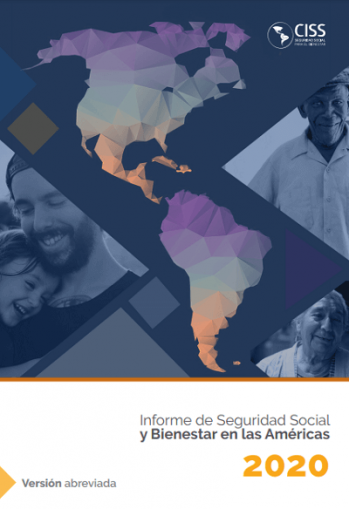
|
|
|
|

|
|
The effect of the perception of violence on social capital in Mexico
Increasing levels of violence in Mexico, which have the potential to damage the very fabric of 1 society, as well as impact key economic variables, led us to analyze the effect that changes in the perception of violence had on social capital fluctuations (including associative capital) between 2006 and 2011. This was a period in which an anti-violence and anti-organized crime policy was launched...
|
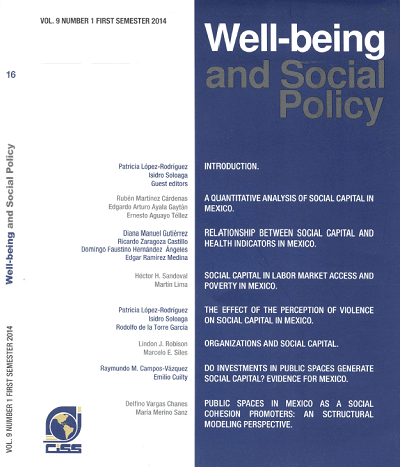
|
|
|
|

|
|
Organizations and social capital
An organization is a group of persons who satisfy established membership requirement and whose form and function are generally acknowledged. An organization's membership requirements may be based on inherited or earned traits. Organizations exist because they provide a setting in which members with similar traits can meet their physical and their socioemotional needs. As the relative importance...
|
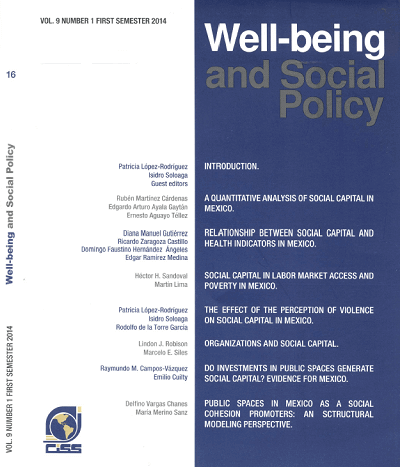
|
|
|
|

|
|
La mutualidad: un camino para una seguridad social integrada
La mutualidad implica una coordinación del esfuerzo colectivo para alcanzar objetivos comunes y en este sentido, supone un modo de socialización que la lleva a constituirse en diversos contextos como una práctica social humanizadora. Mediante la promoción, institucionalización y recreación de estas prácticas es posible construir una economía más humana basada en una ética de la solidaridad y de...
|

|
|
|
|

|
|
Do investments in public spaces generate social capital? Evidence for Mexico
The formation of social capital is critical for developing countries. This paper investigates the effects of attempts to recover public spaces in marginalized areas of Mexico. The effects are estimated through balancing in the propensity scores. We focus on the results of perception of safety, support and social capital. When efforts are made to recover public spaces, the perception of safety...
|
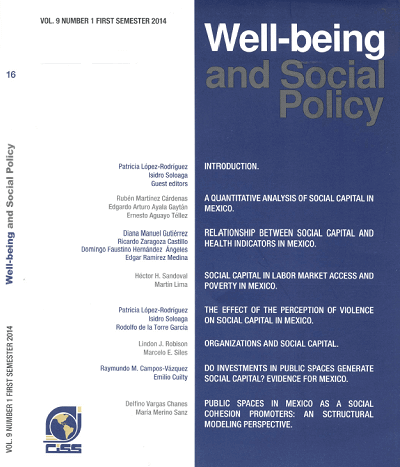
|
|
|
|

|
|
Public spaces in Mexico as social cohesion promoters: an structural modeling perspective
This research assessed the effects of several contextual factors (e.g, neighborhood insecurity, evaluation of public spaces, infrastructure, low risk behaviors) on social cohesion and residential satisfaction, in the context of low and medium-low socio economic status of individuals nearby renovated public spaces (parks and recreational facilities) in Mexico. The research method is based on...
|
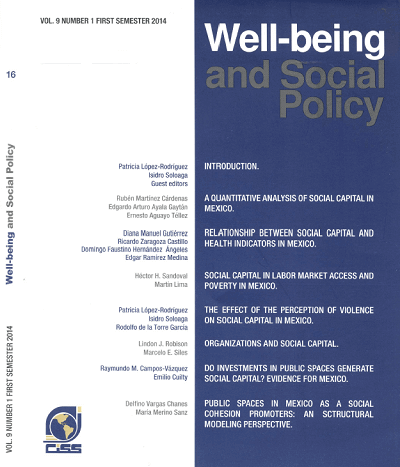
|
|
|
|

|
|
Infantil mortality inequities in Colombia: Progress and challenges after major responsability measures from local authorities
This paper aims to analyse the space and time distribution of the infant mortality rate (IMR) at municipality level in Colombia before and after conferring greater responsibilities to the municipalities for the administration of the local health care systems. Using special econometrics, we find that there is a geographical concentration of IMR persisting over time and defining two groups of...
|
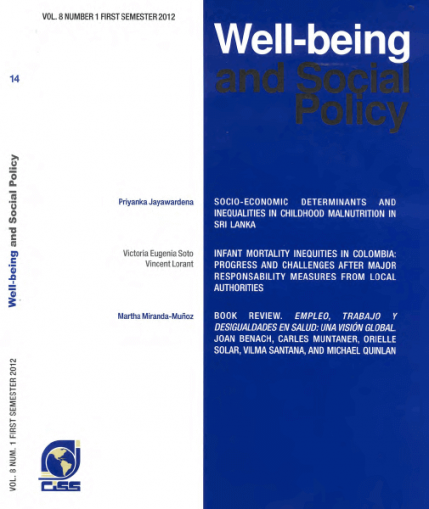
|
|
|
|

|
|
Analysis of the use of financial services by companies in Mexico: What does the 2009 Economic Census tell us?
We present a descriptive analysis of the results of Mexico's 2009 Economic Census regarding the use of bank credit and accounts by productive entities (companies). INEGI was requested to prepare a set of statistics regarding various company characteristics that are relevant to the decisions made by institutions offering banking services. Information was grouped according to company size and to...
|
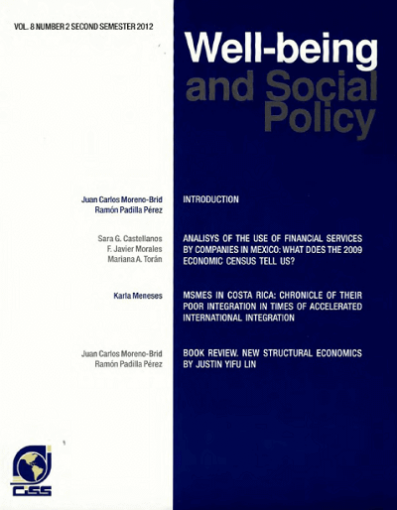
|
|
|
|

|
|
Employability and productivity among older workers: a policy frameworks and evidence from Latin America
As Latin American and the Caribbean countries face rapid aging transitions, the economic contribution of older workers would need to be strengthened. This paper uses household data from Brazil and Mexico to characterize labor market behavior of older workers, such as participation, sector and type of employment, and productivity, to identify critical areas for policy intervention. The paper also...
|
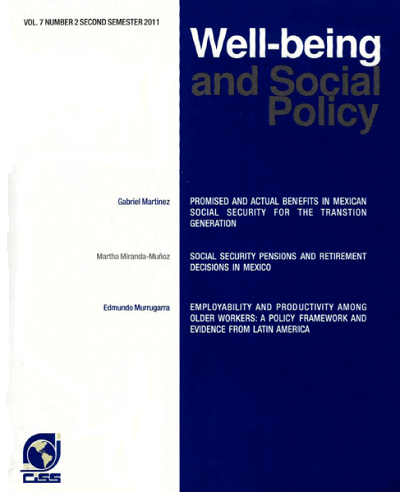
|
|
|
|

|
|
Informe sobre la seguridad social en América 2013: 10 años fortaleciendo el bienestar de los ciudadanos en América
Este Informe sobre la Seguridad Social en América es un resumen y recapitulación de temas que están presentes en los principales debates que se han analizado durante la década anterior. Actualmente, se tiende a identificar que las décadas de los ochenta y de los noventa fueron épocas de reformas en la región, desde Norteamérica y el Caribe hasta el Cono Sur. Sin embargo, en realidad todavía en la...
|
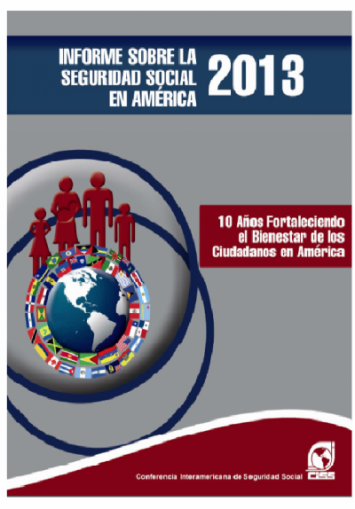
|
|
|
|

|
|
Protecting vulnerable children from uninsured risks: adapting conditional cash transfer programs to provide broader safety nets
Conditional cash transfer (CCT) programs have proved to be effective in inducing chronic poor households to invest in the human capital of their children while helping reduce poverty. They have also protected child human capital from the shocks that affect these households. In this paper, we argue that many non-poor households exposed to uninsured shocks have to use children as risk coping...
|
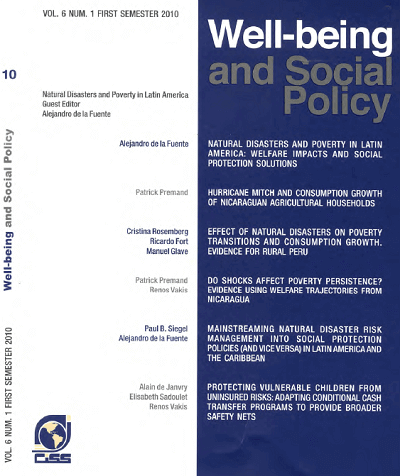
|
|
|
|

|
|
Mainstreaming natural disaster risk management into social protection policies (and vice versa) in Latina America and the Caribbean
This paper presents and applies the social risk management (SRM) conceptual framework to examine links between disaster risk, hazards, vulnerability, risk management, and social protection (SP). The paper makes the case that it is important to mainstream social protection policies into the disaster risk management (DRM) agenda and, vice versa as a means to improve household and community...
|
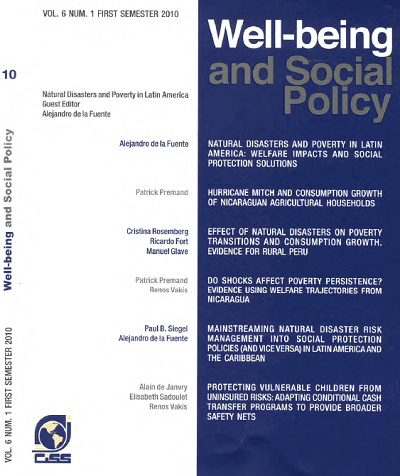
|
|
|
|

|
|
Effect of natural disasters on poverty transitions and consumption growth. Evidence for rural Peru
Natural hazards, an increasingly important phenomenon, have a direct impact at regional and household level. The growing incidence and persistence of natural events are strongly linked to increasing vulnerability of households and communities in developing countries. Previous socioeconomic vulnerabilities may exacerbate the impact of a specific event, making more difficult the process of...
|
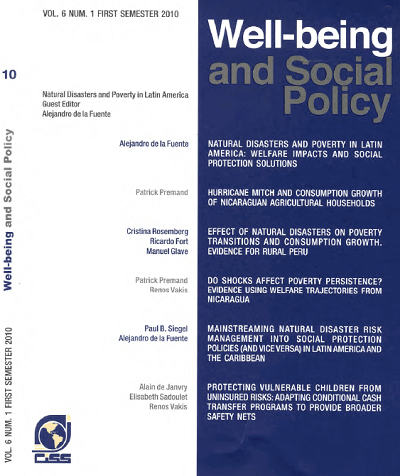
|
|
|
|

|
|
Hurricane Mitch and consumption growth of nicaraguan agricultural households
There is little micro-evidence on the persistence of natural disasters' welfare impacts. This paper assesses the effect of Hurricane Mitch on consumption of Nicaraguan agricultura) households. Mitch occurred in October 1998. Pre-post data is obtained from a nationally representative panel collected in 1998 and 2001. An additional survey was fielded in 1999 for households from the panel affected...
|
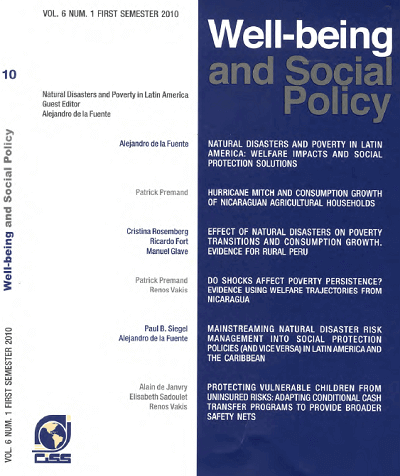
|
|
|
|

|
|
Natural disasters and poverty in Latin America: welfare impacts and social protection solutions
The Inter-American Conference on Social Security (CISS) and the United Nations Development Programme (UNDP) Office in Mexico jointly organized the conference “Natural Disasters in Latin America: Welfare Impacts and Social Protection Solutions” held in Mexico City in January 2010. The main objectives of the conference were to improve the understanding of (i) how natural disasters affect...
|
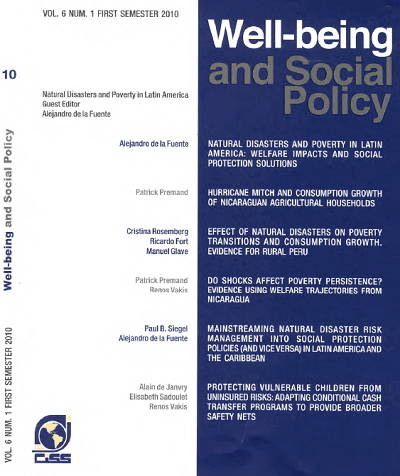
|
|
|
|

|
|
Book review. Informe de evaluación de la política de desarrollo social en México 2008, CONEVAL
The Evaluation Report on Social Development Policy in Mexico was published by the National Council for Social Development Policy Evaluation (CONEVAL) in 2008. The Council is one of the constituting elements of the new institutional framework to evaluate the public sector performance, particularly social development policies that were put in place mostly during the first decade of this century....
|
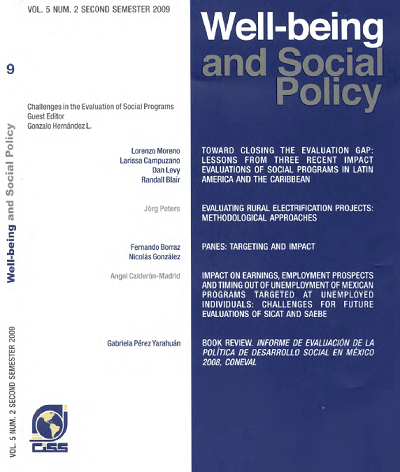
|
|
|
|

|
|
Impact on earning, employment prospects and timing out of unemployment of mexican programs targeted at unemployed individuals: challenges
his paper presents estimates of the impact of programs for unemployed workers on the performance of program beneficiaries in Mexico. We emphasize the significance of applying methodologies capable of avoiding statistical bias attributable to unobserved variables when measuring the impact on earnings and allowing to us properly estimate unemployment duration and work status after exiting from...
|
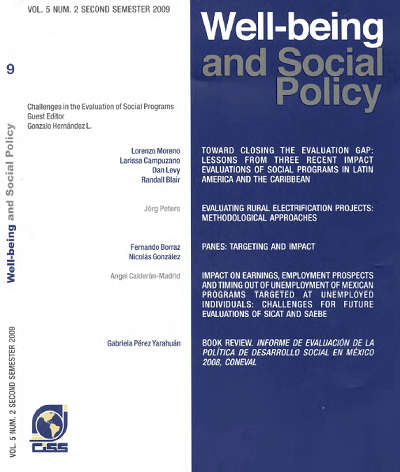
|
|
|
|

|
|
PANES: targeting and impact
This research paper intends to quantifit targeting performance in terms of the efficiency of the 1 National Plan for Social Emergency Assistance (PANES) implemented in Uruguay between 2005 and 2007 and determine its impact on relevant issues such as school attendance, child labor and the labor market. For this analysis , we used 2006 and 2007 Continual Household Survey (ECH) data.
Our outcomes...
|
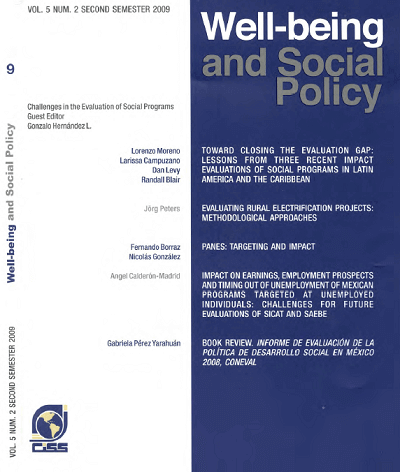
|
|
|
|

|
|
Informe sobre la seguridad social en América 2002: Problemas de financiación y opciones de solución
Para la edición de este proyecto se seleccionó el tema de los problemas de financiación de la seguridad social en el continente y las opciones de solución. Se pensó que el análisis y discusión de estos asuntos obligaría a considerar los fundamentos mismos de la seguridad social: establecer definiciones, aclarar las razones por las cuales es necesaria la participación del Estado, comprender por...
|
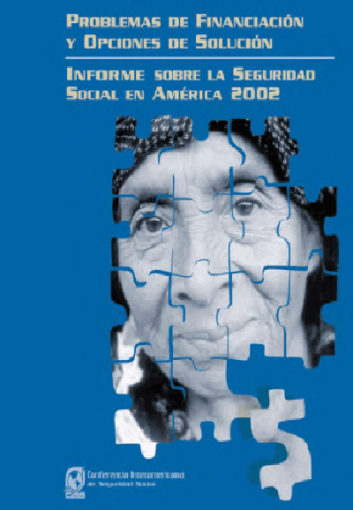
|
|
|
|
|